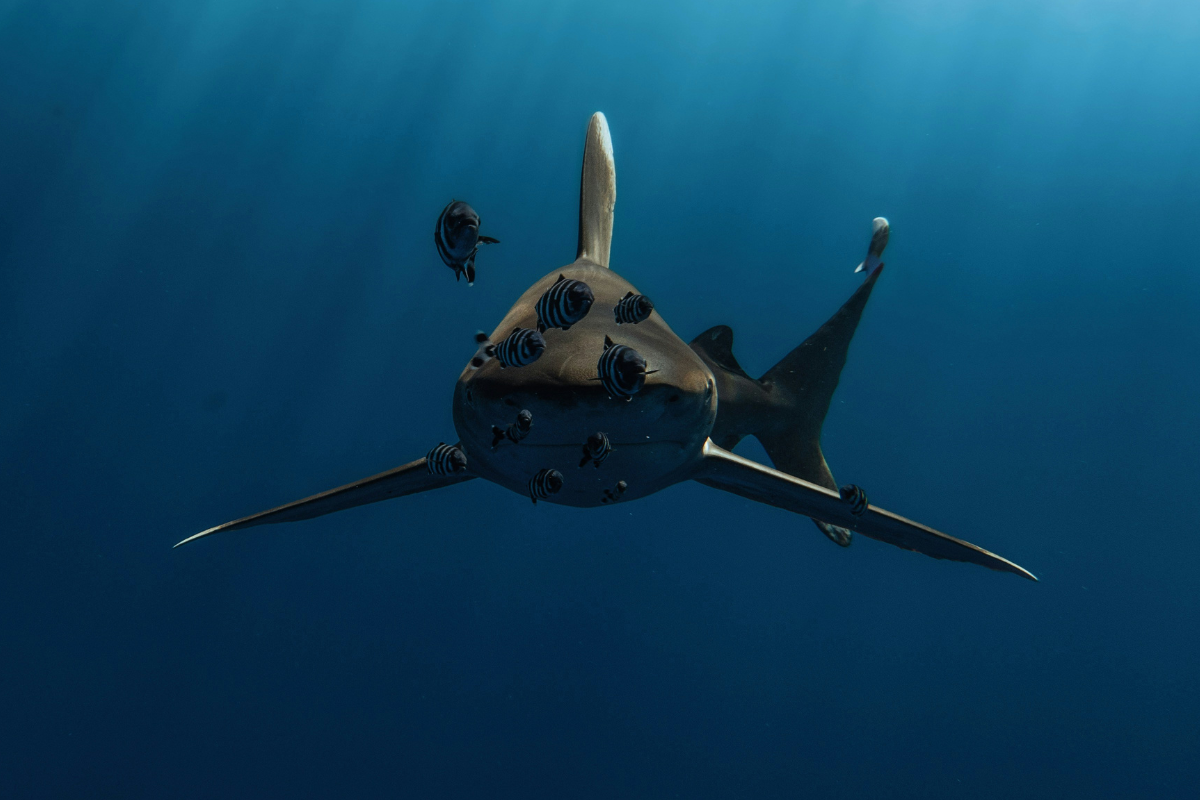Boo-hoo. So now the charter-boat captains who make their blood money off the gruesome practice known as “sport-fishing” are complaining that sharks are eating their trophy fish.
In an account published by Outdoor Life, Bob McNally likens the saltwater predator to the “taxman,” meant to describe “any shark that steals a hooked fish (or part of it) off an angler’s line.”
“Although sharks exist on all major coastlines, they’ve become especially problematic in the Atlantic and Gulf Coast, where many charter captains say they’re losing more fish than ever before,” McNally writes. “The warm waters of the South seem to be a particularly troublesome region for fish-stealing sharks…”
Leaving aside the telling analogy of taxation as theft, the fact is sharks eat fish for a living, and they have proven over millions of years that they are very good at it. Especially when their natural prey is already injured and bleeding, fighting for its life at the end of a rich man’s monofilament line. “Fish-stealing” sharks? Cry me a river, Bob.
The real criminals are the charter-boat clients and the fish-eating consumers who make this misery possible.
The good news for the innocent sharks involved is that, while habitat loss, fishing, and other practices such as shark finning have greatly depleted many shark populations overseas, most species of sharks in U.S. waters are on the rebound after decades of fishing and vengeful killing, according to the National Marine Fisheries Service. There are some 500 species of sharks worldwide, with more than 100 species found along the Pacific and Atlantic coast, and Gulf Waters.
The Magnuson-Stevens Act, first passed in 1976, instituted standards for fishing in federal waters, with rules designed to prevent depletion of stocks.
“Enforcement and legislation have kind of brought shark populations back up in the U.S.,” Valerie Hagan, a biologist working towards shark conservation at the Mote Marine Laboratory, told WUFT, a Florida public television station, earlier this year.
Those protections include FoA’s landmark victory to make the scalloped hammerhead shark the first species of shark ever to be protected by the Endangered Species Act. The final rule to list four of the existing six distinct population segments of scalloped hammerhead sharks as threatened or endangered occurred in 2014.
A mega loss of ‘mega fish’
The bad news is that NOAA Fisheries continues to allow the fishing of more than 50 species of sharks in U.S. waters, even while admitting that six of those species are being “overfished.” The fact that this government agency “manages” these threatened shark species to “ensure a safe and sustainable seafood supply” is appalling. There is no good reason to eat shark, or any other fish.
It’s even worse for large migratory predatory fish—the marlin, sailfish and tuna so prized by trophy fishers. Scientists from the Future of Marine Animal Populations project report that up to 90 percent of all large predatory oceanic fish such as cod, sharks, halibut, grouper, tuna, swordfish, and marlin have been depleted.
A regrettable part of that pressure comes from the scores of deep-sea fishing tournaments that take place each season throughout U.S. waters. To cite just one heinous example: Hailed as the “World’s Largest Billfishing Tournament,” the White Marlin Open has been run out of Ocean City, Maryland, for 50 years. This year’s event, to be held Aug. 5-9, is expected to have thousands of fishers in 400 boats competing for prizes totaling more than $2 million. The organizers claim most caught fish are released, although the biggest, most genetically valuable “trophy” fish are always sacrificed to become a Styrofoam replica on somebody’s wall.
The sight of a majestic marlin strung up by a rope on a dock alongside grinning yahoos is parallel to seeing Donald Trump Jr. posing next to a dead elephant he’s just killed.
Sharks got the blame for “spoiling” the 2023 Big Rock Blue Marlin Tournament, based in Morehead City, N.C. A boat full of anglers brought a 619.4-pound blue marlin to the dock, sure it was big enough to allow them to take home $3.5 million in prize money. The marlin was ruled ineligible after shark bites were found on its body. Since then, the calls from charter-boat captains to relax fishing restrictions on sharks have only grown louder.
Right whales as roadkill
To make matters worse, these anglers use the very same high-speed, deep-drafted boats that have been implicated in the deaths of numerous endangered whales. Charter-fishing boats, pleasure boats and commercial vessels traveling too fast are killing so many North Atlantic Right Whales that fewer than 340 remain, including no more than 70 breeding females. Since 2017, there have been 36 dead Right Whales and 78 injured or ill.
Three of the four known vessel strike events that involved mothers and calves since 2020 involved vessels between 35 and 65 feet in length—a description that matches the high-powered boats that race far out from shore to find the remaining few marlin, swordfish and tuna left to hunt down and kill.
Friends of Animals, along with the Animal Protection League of New Jersey, sent an open letter to President Biden on Earth Day to ask him to stop delaying and immediately issue a speed rule to prevent further suffering and death. The National Oceanic and Atmospheric Administration proposed changes to the North Atlantic Right Whale vessel speed regulations back in 2022.
We say, end the barbarous practice of sport fishing, protect endangered whales and keep fish in the sea—and off your dinner plate. Humans don’t need fish to survive, but sharks and other mega fish of the ocean do. And they were here first.

